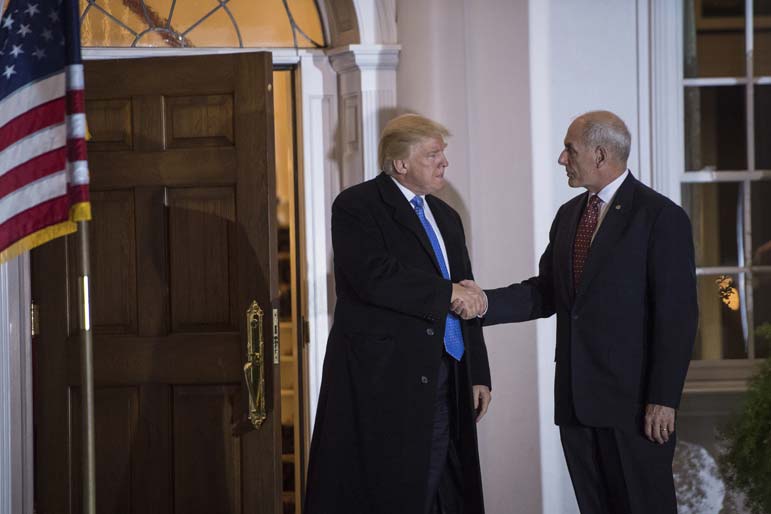 Washington Post photo by Jabin Botsford
Washington Post photo by Jabin Botsford
John Kelly was not the sort of Marine general who dreamed of working in Washington. He likely never expected he would work in the White House.
In choosing Kelly to be his new chief of staff, President Donald Trump has turned to someone who in many ways is the opposite of his predecessor Reince Priebus, a seasoned political operator.
Kelly, like the president he serves, has limited experience in politics and only passing familiarity with many of the big domestic issues that will cross Trump's desk. Instead of a deft political sense, he will bring some plain-spoken discipline to an often chaotic West Wing.
The 67-year-old Kelly, who is relatively close in age to Trump, has bonded quickly with a president who has often seemed overwhelmed and isolated in Washington.
"Sometimes you feel alone and besieged," said a Kelly confidante who also knows the president. In Kelly, Trump's Homeland Security secretary, the president has picked both an enforcer for the West Wing and someone who can be a friend.
In his 40 years in the military, Kelly developed a reputation for bluntness that won him the respect of his fellow Marines and sometimes grated on senior officials in the Obama administration. He is best known in Washington as an experienced battlefield commander who led U.S. troops in Iraq and lost a son in Afghanistan in 2010 to a Taliban bomb.
But the most relevant experience he will bring to the chief of staff job is a tour as senior military adviser to defense secretaries Robert Gates and Leon Panetta in the Pentagon. The job demanded Kelly act as a disciplinarian, pressing to make sure the military service chiefs and the sprawling Pentagon bureaucracy were executing the defense secretary's agenda.
He also acted as a gatekeeper, deciding which of the military service's top brass would get time with the defense secretary each day.
The president "clearly needed some adults in the room," said Kelly's longtime friend, who spoke on the condition of anonymity to offer frank opinions. "It's the end of the end of the chaos. Not with John Kelly around."
But in Trump, Kelly will be serving a boss who is far different than Gates and Panetta, two disciplined Washington hands. He will be working in a freewheeling Trump White House that has little in common with the regimented and hierarchical world of the Pentagon or Marine Corps.
As a four-star general, Kelly was frequently at odds with the Obama White House. He spoke out forcefully on issues ranging from Obama's plan to shutter the prison complex in Guantanamo Bay, Cuba, to the perceived vulnerability of America's borders. At a time when the Obama administration was trying to wind down America's wars and calm fears of a terrorist attack, Kelly often spoke of the threat posed by groups like the Taliban in dire terms.
"Our country today is in a life-and-death struggle against an evil enemy, but America as a whole is certainly not at war," Kelly said in a speech to Marine veterans four days after his son was killed. "Not as a country. Not as a people."
Kelly was similarly a voice of doubt as the Obama administration pressed to open combat jobs to women. "They're saying we are not going to change any standards," Kelly told reporters at the Pentagon. "There will be great pressure, whether its 12 months from now, four years from now."
As the four star general in charge of U.S. Southern Command, Kelly oversaw the military detention center at Guantanamo Bay. His weekly updates on the prison, which were blasted out to dozens of White House and Pentagon officials, became well known for their candor. "His vernacular wasn't the typical government prose," said one former White House official. "He would call out some of the military commission judges, saying that they had no idea what they were doing."
Kelly's move to the chief of staff job alongside Lt. Gen. H.R. McMaster, the national security adviser, means military officers will now occupy two of the most important and senior positions in the White House.
Kelly is also a confidante of Defense Secretary Jim Mattis, a retired Marine general and Kelly's former commander during the 2003 Iraq invasion. The two men, both devout Catholics, frequently prayed together on Sundays.
When Mattis decided to relieve one of his brigade commanders in the middle of a battle, he sent Kelly to tell the officer he was being removed.
Gen. Joseph Dunford Jr., the chairman of the Joint Chiefs of Staff, is one of Kelly's closest friends and was the one who rang the doorbell at his home early one morning in 2010 to tell him his son had been killed in Afghanistan.
The instant he saw Dunford, dressed in his service uniform on the front porch, Kelly said he knew his son Robert was dead. "It was disorienting, almost debilitating," Kelly wrote of that morning. "At the same time my mind went through in detail every memory and image I had of Robert from the delivery room to the voice mail he'd left a few days before he died. . . . It was as graphic as if I was watching a video."
As Homeland Security secretary, Kelly helped implement Trump's controversial travel ban and other initiatives aimed at curbing illegal immigration. Kelly also revoked an Obama-era initiative that sought to delay the deportation of parents of U.S. citizens, though he let stand a similar program for children.
He has seemed to share many of the president's hard line views on immigration, and he did not shy from advocating his position forcefully in public. In February, he told the House Homeland Security Committee it was "entirely possible" dangerous people were entering the U.S. without a ban in place, and that officials might not know until something bad had happened.
"Not until the boom," he said when asked if he could provide evidence of a dangerous person entering the country.
He also has been quick to shoulder the blame when Trump administration initiatives, such as the travel ban, triggered a backlash from lawmakers who felt blindsided.
"This is all on me by the way," Kelly testified.
"I should have delayed it just a bit so that I could talk to members of Congress."
Previously:
• 05/17/17: New role for McMaster: Trump's shield
• 03/20/17: The battle to define an 'America First' foreign policy divides the Trump White House
• 02/22/17: Trump's new national security adviser: A soldier who can say 'No sir
• 02/07/16: Prez's phoning is reverberating across the world as foreign leaders consider how to react
• 11/18/16: Trump's embrace of Bannon sparks divisions, angst among Jewish groups
• 06/27/16: Why it was a brutal week for Obama and his liberal vision of an interconnected world
• 04/19/16: Contrary to conventional wisdom, the U.S. has actually had a major decline in gun violence. But here's why


 Contact The Editor
Contact The Editor
 Articles By This Author
Articles By This Author